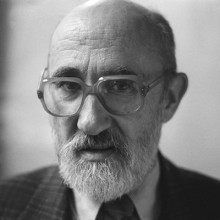Polish literature

Stefan Bratkowski
Born in Wroclaw in 1934, Stefan Bratkowski is one of the most outstanding Polish journalists of the last few decades.
From the very beginning of his career in the 1960s, he showed great talent and formulated his interests in economics, economic history, the history of engineering, and management. He approaches these subjects as a humanist and examines their cultural implications. Bratkowski is fascinated by the ideas on which material culture is based and the ways in which early and present-day societies have been run. He uses the past to illuminate the present. Bratkowski is undoubtedly the leading Polish proponent of modernity; he is also regarded as a consistent positivist, or pragmatist. As expressed in hundreds of articles, his views consistently center around the same values and ideas--praise of solid workmanship and economic autonomy and freedom in a spirit of social solidarity. The reform programs and visions of a socio-economic order that he formulates are always a subject for heated discussions and an important component of Polish intellectual life. Bratkowski writes with verve and his texts are marked by precise explanation, as well exceptional erudition and writing talent. Bratkowski produced two unusually interesting book-length essays. One of them, The Springtime of Europe, is a wide-ranging treatment of the medieval idea of European universalism. Bratkowski highlights the links between medieval issues and the present-day discussion of European integration. He is also fascinated by the figure of Sylvester II, the Pope who sketched a bold vision of a united Christian Europe and was also the foremost scholar of his day. Another of Bratkowski's books is also the highly original The Shortest History of Poland in which he presents the most important events and political processes in Polish history in an accessible form with all the strengths of good oral story-telling.
BIBLIOGRAPHY
- Świat, w którym żyjemy, Warszawa: Horyzonty, 1970.
- Skąd przychodzimy, Warszawa: Iskry, 1975, (wydanie rozszerzone - Warszawa: BGW, 1993).
- Z czym do nieśmiertelności, Katowice: Śląsk, 1977.
- Oddalający się kontynent, Warszawa: PIW, 1978.
- Nowy Marsyliusz czyli społeczeństwo inteligentne, Warszawa: PIW, 1981.
- Jak robić interesy razem, Warszawa: Iskry, 1997.
- Wiosna Europy. Mnisi, królowie i wizjonerzy, Warszawa: Iskry, 1997.
- Najkrótsza historia Polski, Warszawa: KAW, 1998.
- Pan Nowogród Wielki, Warszawa: Warszawa: KAW, 1999.
- Podróż do nowej przeszłości, Warszawa: Veda, 2000.
- Nieco inna historia cywilizacji: dzieje banków, bankierów i obrotu pieniężnego, Warszawa: Wydawnictwo Nowoczesność, 2003.